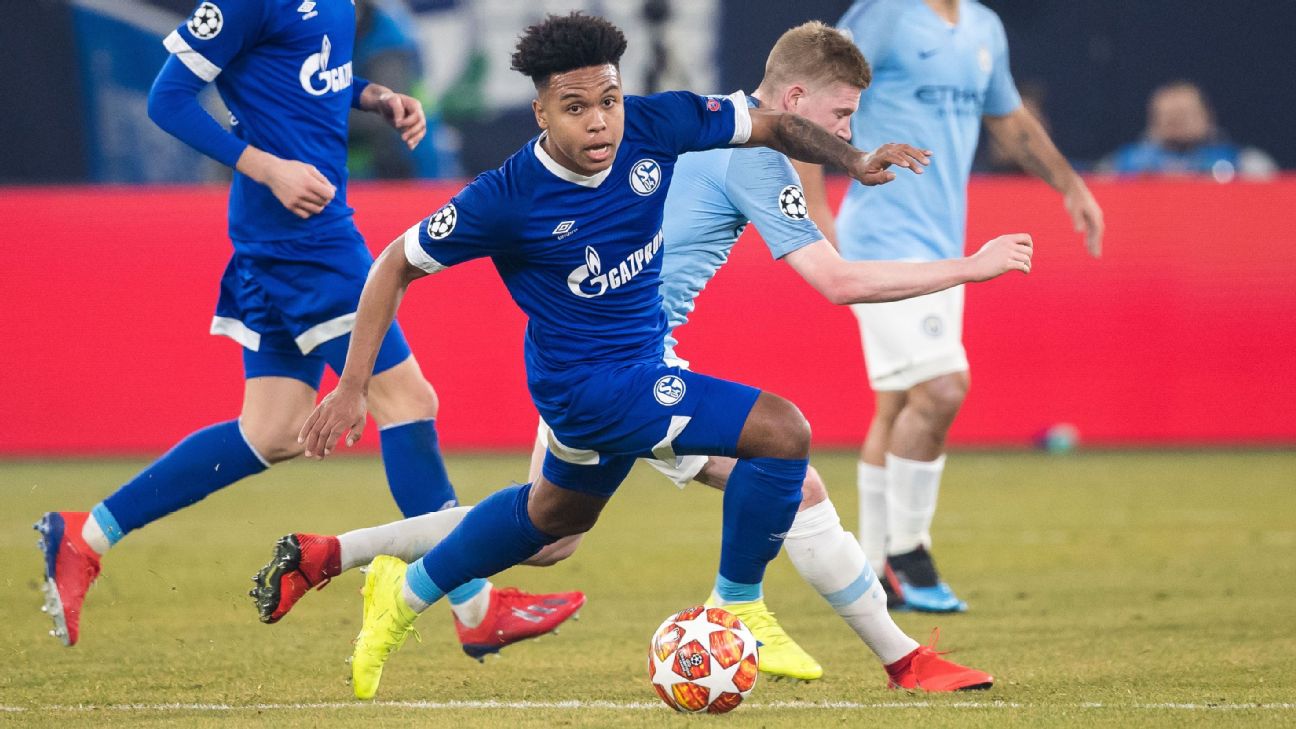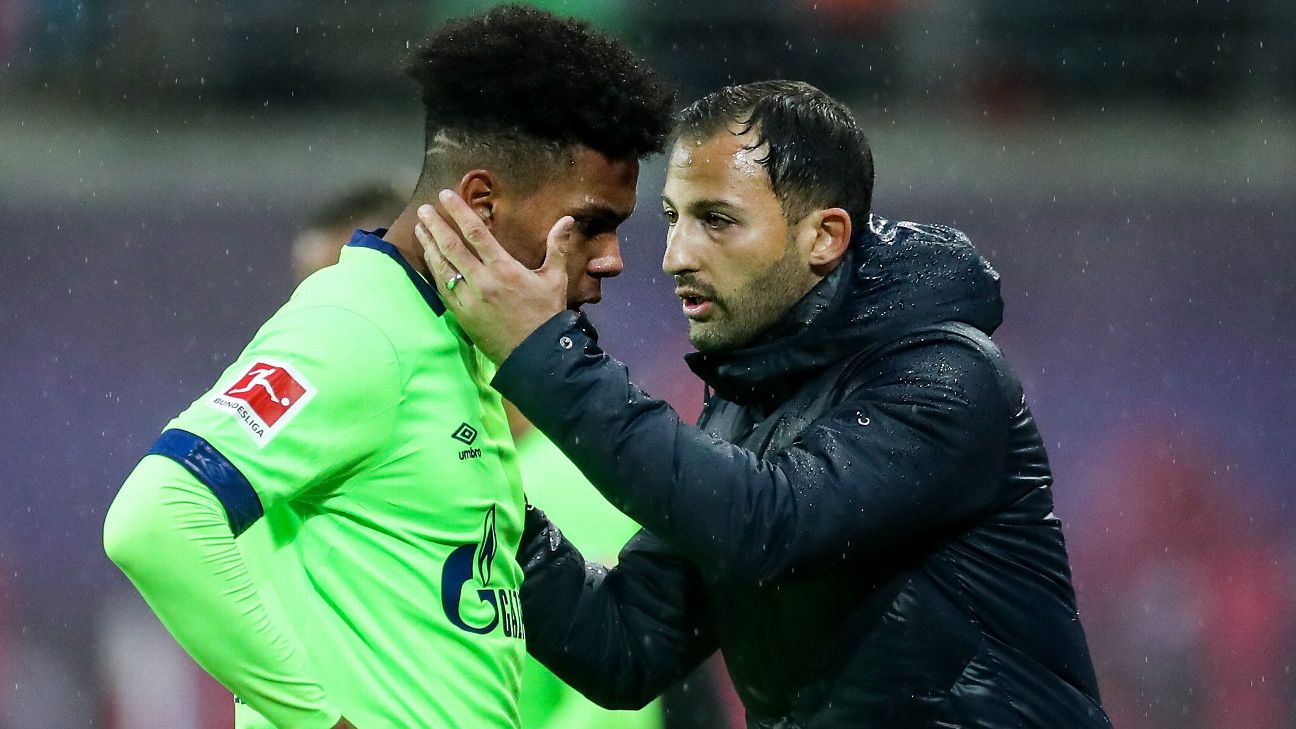

GELSENKIRCHEN, Germany — With every passing day, every training session and every game, Weston McKennie has come closer to becoming fully established at the third-biggest club in the Bundesliga. When you’re 20 years old, gifted with a body that’s only becoming stronger and a mind tuned into the concept of personal growth, time is on your side. But not this week.
This week, McKennie is racing against the clock. The United States international midfielder is desperate to overcome a hamstring injury to make the pitch for his crisis-riven Schalke side against Fortuna Dusseldorf on Saturday, in a match that’s been dubbed “the game of fate for [Schalke coach] Domenico Tedesco” by SportBild.
The 33-year-old is under severe pressure following a 3-0 defeat at Mainz that left the Royal Blues in 14th spot. Another poor result could see the German leave his position, which would deprive McKennie of his most important mentor. Without Tedesco’s relentless coaching and dedication, the Texas-born McKennie would probably not have gone from hopeful academy player to a regular starter in the course of 18 months.
“It really helps you psychologically, mentally, whenever you see someone telling you that you can get better at this, tell you what you do wrong, what you’re doing right,” McKennie told ESPN. “It shows that he cares about you, it shows that he’s paying attention to you. And, as a person, I need a lot of attention, my girlfriend always says I need a lot of attention [he adds with a laugh]. So you know it helps out, mentally. Because if I go throughout training and I’m messing up and the coach doesn’t say anything to me, then I’m thinking like does he even care about me?”
Tedesco, a former amateur player and trained engineer who started out coaching the U7s of his village team in Swabia, does care. Last season, he helped McKennie overcome physical problems by gently nudging him towards more time in the gym and assigning him a nutritionist to help with his diet. Then, at the beginning of the season, he came up with a checklist of things that the player needed to improve on the pitch.
“Attacking-wise, defensive-wise, maybe shooting as well… he went over all the stuff that I can get better on,” McKennie recalls. “Maybe [also] one-on-one defending. When turning, I’ll sometimes maybe stiffen my hips [making it harder] to turn a 180 degree so…. He’s helped out a lot. He’s easy to talk to.”
 Weston McKennie played through pain in the Champions League first-leg clash with Manchester City.
Weston McKennie played through pain in the Champions League first-leg clash with Manchester City.
McKennie’s gratitude and admiration for Tedesco’s hands-on approach goes a long way to explain why the manager is still in the job following a series of fairly disastrous results. The dressing room is still with him, despite only one win in seven games in all competitions, and mostly turgid performances. But one more defeat could spell the end for him.
In Christian Heidel, he’s lost a key ally; the club’s sporting director stepped down on Saturday. Heidel’s successor, Jochen Schneider, won’t have any qualms pulling the trigger if there are no signs of improvement against promoted club Fortuna Dusseldorf, who have gone from virtual no-hopers in the autumn to a midtable side, better positioned than 14th-placed Schalke, who are much more powerful financially. Runners-up last season, they’d be close to going down if it hadn’t been for a bunch of sides doing even worse.
McKennie blames a lack of “effectiveness” for their poor run — 25 goals scored in 23 games is not nearly enough. Whether he can help his teammates and coach in this hour of need is doubtful. He felt his hamstring tighten against Manchester City last week, but it was the Champions League, and it was City. He played on for 80 minutes in the 3-2 defeat, aggravating his tired muscle further. Now, he’s having intensive one-on-one treatment instead of team practice and he’s just run up and down the flights of stairs in the hallway of his apartment eight times to see how his legs respond before meeting ESPN at the Veltins-Arena.
The worst-case scenario, he says, would be a repeat of the upsetting scenes in Mainz, when the entire Schalke team were stood in front of the away section, forced to listen to the raw anger of the most hardcore fans.
“I wasn’t there unfortunately [because of the injury] but I watched it at home,” he says. “It’s a professional player’s nightmare, knowing the people that you play for, that you try win points for and everything, are upset. And it hurts even more because you see them [up close]. They’re people that you fight for, the people that you give everything for and they gave everything for you. Not being able to get them points is like not being able to get a kid a Christmas gift. They might not see how you feel or see what’s going on in your head but it’s something that you kind of have to swallow, you have to digest it, all you can do is to helpfully get the points against Dusseldorf for them.”
 Weston McKennie says he responds well to Domenico Tedesco’s hands-on approach to coaching him.
Weston McKennie says he responds well to Domenico Tedesco’s hands-on approach to coaching him.
Schalke is a club of big emotions, volatility is baked into its DNA. McKennie has been in awe of the crowd’s power to carry their side but during these dark days, the unrequited love from the stands can quickly turn into resentment, too. “They can get a little antsy, they whistle and let you know your opinion…” McKennie says, adding that the fans’ impatience can negatively impact the team, by pushing them to play a pass forward that isn’t really on and lose their cool.
It can’t be easy keeping your self-belief up in such a maelstrom, especially for a 20-year-old kid at the beginning of his career. McKennie, though, comes across as very calm and unshakeably optimistic. He’s been taking some pointers from a motivational YouTube video by The Rock, Dwayne Johnson, as it happens.
“He [The Rock] said: ‘In the situation that we’re in right now we’re so far down that you know our back’s up against the wall. There’s a bad thing of course, your back is up against the wall. But the good thing is, there’s no way to go back more. There’s only one direction: forward.’ I look at it that way. I have nothing else to lose. Don’t look down, look up, be confident. The fans feel if you’re scared or aren’t willing to give everything you have. That’s not the person I am. No matter what the situation it is, if I’m sick, if I’m feeling injured, I’m still going to try and give everything I can until I can’t anymore. The key is to not lose your confidence, and then, to know that there’s going to be a better time.”
Hopefully for him and Schalke, that time starts now.

Be the first to comment